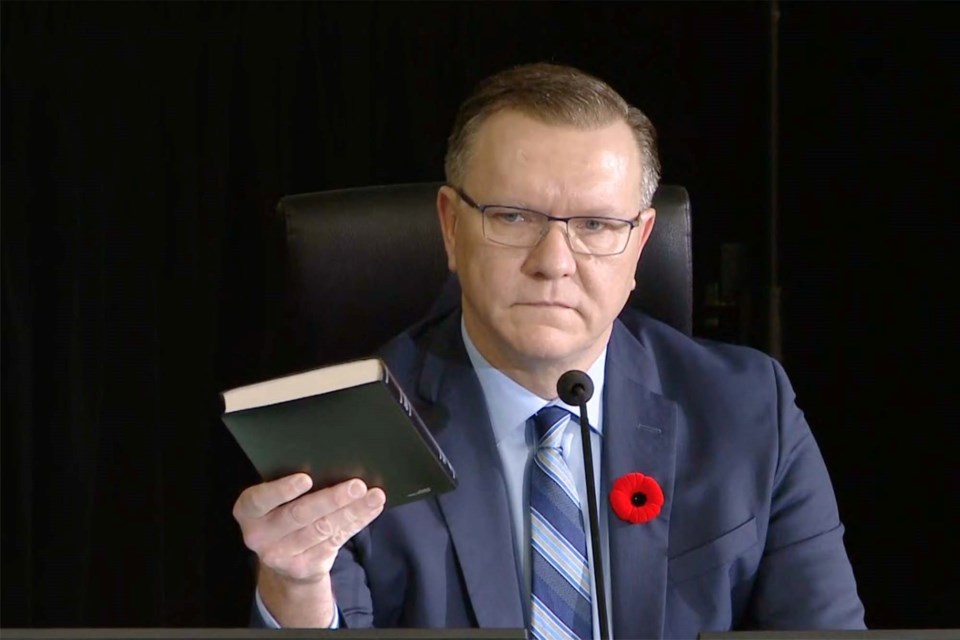A St. Albert lawyer testified police leaked information to "Freedom Convoy" organizers during last winter's protests against COVID-19 health mandates.
Keith Wilson, who provided legal services to convoy participants, appeared at the Public Order Emergency Commission in Ottawa on Nov. 2.
Wilson testified convoy organizers received information from some sympathetic police. In a scrum with reporters after his testimony, he said these police provided information about raids and their planning.
“The reality that we were facing at the time is that police officers and security officials were all of the different agencies in Canada. A large number of them had lost their jobs because of the requirement to be vaccinated on the federal mandates. And others had gotten vaccinated, but felt they were forced into it in order to keep providing for their family.
“As a result, when information was known to them about some of the activities, it was regularly filtered down through various protesters and those within the leadership group,” he said.
The commission is an independent public inquiry to assess the federal government's decision to invoke the Emergencies Act on Feb. 14. The act was in response to the convoy's occupation of downtown Ottawa from Jan. 28 to Feb. 18, and to border blockades in locations including Coutts, AB.
Wilson was one of around 65 witnesses — who include protest participants, law enforcement members, federal, provincial, and municipal government officials, as well as individuals, businesses and organizations — called before the commission.
While some Ottawa residents have said the protests were a frightening siege of the city, Wilson described events as peaceful and respectful.
He said he was aware of allegations of intimidation and threats against the citizens of Ottawa, but what he experienced upon arriving “was Canadians, particularly immigrants of all ethnic backgrounds, coming together in a very peaceful, respectful way with a deep concern about what the federal government and governments were doing to their rights and freedoms.”
“We drove through the downtown … that was my first chance to see where all the trucks and the protest vehicles were, and all the signage and, and so on … you could still drive around, there was always one lane open. That's how we got right to the hotel.
“When I walked into the lobby, I can really feel the tension. There was truckers everywhere. There was supplies stacked and piled everywhere. And the tension was ... I can really feel the tension,” he said.
Wilson assisted convoy organizer Tamara Lich in a press conference, video of which was played as evidence to the commission.
During Wilson’s approximately two-hour testimony, he spoke about why he got involved in the protests. He said his wife encouraged him participate in the movement.
“She became very concerned about what she was seeing in terms of government policy health policy. I felt that things were badly going awry, and she did something she's never done before, but she encouraged me to get involved,” he said.
A fellow lawyer asked Wilson if he’d be willing to take the case for the Justice Centre for Constitutional Freedoms, a legal advocacy organization that represented protesters.
“They needed senior litigation counsel, I agreed,” he said.
Wilson said through the course of his career he has represented many landowners, farmers and ranchers in Alberta in disputes with oil companies.
“But ... much of my practice has been focused on helping people when governments, in their mind, has gone too far affecting their life or their business or their livelihood. And so I've done a lot of judicial review and administrative law and tribunal work,” he said.
Wilson said there was a shifting tone from police in Ottawa.
“I never imagined that our government, our federal government, would use that level of force against nonviolent, peaceful Canadians,” he said.
He also told the commission the protests attracted fringe elements.
“They were doing weird seance things and burning things in the lobby,” he said. Wilson said there was a constant effort by organizers Lich and Chris Barber to “fend them off.”
On Nov. 3, interim Ottawa Police Chief Steve Bell told Parliament the police force would initiate an internal investigation into allegations of police leaks and would reach out to Wilson. Bell was speaking to a special joint committee on the Emergencies Act declaration.
The public hearing for the commission started on Oct. 13 and will run until Nov. 25. Justice Paul Rouleau is commissioner of the Public Order Emergency Commission and will submit a final report to the Government of Canada by Feb. 6, 2023.
Prime Minister Justin Trudeau invoked the Emergencies Act on Feb. 14, 2022, to “give the federal government special powers to end disruptions, border blockades, and the occupation of Ottawa’s downtown core.” The act was revoked on Feb. 23.
It was the first use of the act since it became law in 1988.
The hearings can be found at: https://publicorderemergencycommission.ca/public-hearings/




